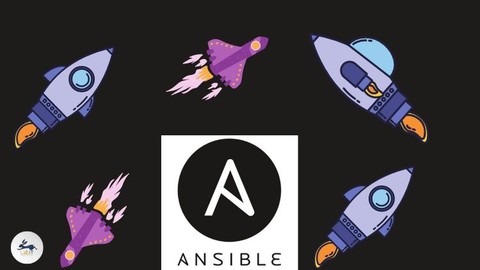
Ansible for an Absolute Beginner – Automation – DevOps
Ansible for an Absolute Beginner – Automation – DevOps, available at $74.99, has an average rating of 4.55, with 55 lectures, 10 quizzes, based on 78 reviews, and has 1231 subscribers.
You will learn about An Introduction to the world of DevOps Hands-On Lab exercises Introduction to Automation Introduction to YAML Deep dive into Ansible Playbooks with Hands-On excercises Understand how to setup and manage inventory files Understand and setup Ansible roles with the help of hands-on excercise Understand the different variables types in Ansible Practice building an event handling system in your playbooks using handlers Ansible Vault and securing your Ansible deployment Automate provisioning of servers and applications This course is ideal for individuals who are Cloud Engineers/Architects or SecDevOps professionals or System Administrators or Automation Engineers or Students or professionals eager to learn automation using Ansible It is particularly useful for Cloud Engineers/Architects or SecDevOps professionals or System Administrators or Automation Engineers or Students or professionals eager to learn automation using Ansible.
Enroll now: Ansible for an Absolute Beginner – Automation – DevOps
Summary
Title: Ansible for an Absolute Beginner – Automation – DevOps
Price: $74.99
Average Rating: 4.55
Number of Lectures: 55
Number of Quizzes: 10
Number of Published Lectures: 55
Number of Published Quizzes: 10
Number of Curriculum Items: 65
Number of Published Curriculum Objects: 65
Number of Practice Tests: 1
Number of Published Practice Tests: 1
Original Price: A$29.99
Quality Status: approved
Status: Live
What You Will Learn
- An Introduction to the world of DevOps
- Hands-On Lab exercises
- Introduction to Automation
- Introduction to YAML
- Deep dive into Ansible Playbooks with Hands-On excercises
- Understand how to setup and manage inventory files
- Understand and setup Ansible roles with the help of hands-on excercise
- Understand the different variables types in Ansible
- Practice building an event handling system in your playbooks using handlers
- Ansible Vault and securing your Ansible deployment
- Automate provisioning of servers and applications
Who Should Attend
- Cloud Engineers/Architects
- SecDevOps professionals
- System Administrators
- Automation Engineers
- Students or professionals eager to learn automation using Ansible
Target Audiences
- Cloud Engineers/Architects
- SecDevOps professionals
- System Administrators
- Automation Engineers
- Students or professionals eager to learn automation using Ansible
“Very clear explanation about DevOps too for beginner. It really helped me better understand the concept and what can of tasks I can automate better.” ~ Student Testimonial
“Great course covering Ansible basics 🙂 can’t wait for other ones!” ~Student Testimonial
New to the world of DevOps and Automation?Awesome ,this course assumes you are an absolute beginner and I will teach you everything starting from scratch.
In this course I will start with a basic introduction to DevOps and introduce concepts such Automation, configuration management , Pull vs Push architectures and YAML and how Ansible fits into this picture. Then I’ll help you setup your lab system followed by a deep dive into the various Ansible concepts such as roles, inventory files, handlers. You’ll have plenty of opportunity to practice what you’ve learnt with hands-on lab exercises.
Real World Final Project
We’ll finish strong by doing a Final Projectto give you real world experience by automating deployment of Elasticsearch which is a SecDevOps tool used to analyse system/application log data using Ansible.
Why this course?
I have created this course with a focus on teaching skills from scratch, I try and explain each concept and keyword that is usedduring the course so that it is easier for you to learn these concepts and implement DevOps and Automation in real world. Here are some student testimonials
“I like teaching style of the instructor, he explains every concept in a very easy to understand manner. Also, the course material looks awesome so far.” ~ Srikant Singh
“Amazing Tutorial.Really awesome for beginners” ~Damilola Dennis Agboola
What is Ansible?
Ansible is a radically simple IT automation engine that automates cloud provisioning, configuration management, application deployment, intra-service orchestration, and many other IT needs.
Designed for multi-tier deployments since day one, Ansible models your IT infrastructure by describing how all of your systems inter-relate, rather than just managing one system at a time.
It uses no agents and no additional custom security infrastructure, so it’s easy to deploy – and most importantly, it uses a very simple language (YAML, in the form of Ansible Playbooks) that allow you to describe your automation jobs in a way that approaches plain English.
Legal Notice:
Ansible® and Ansible Tower® are registered trademarks of Ansible, Inc. in the United States and other countries. This course is not certified, accredited, affiliated with, nor endorsed by Ansible, Inc.
Course Curriculum
Chapter 1: Introduction
Lecture 1: Introduction
Lecture 2: Basics of Automation
Lecture 3: Basics of DevOps
Lecture 4: Basics of Configuration management
Lecture 5: Pull vs Push based configuration management architecture
Lecture 6: Ansible: A birds-eye view
Lecture 7: Overview of YAML
Chapter 2: Lab Setup
Lecture 1: Lab Architecture
Lecture 2: Install Virtualbox on Windows
Lecture 3: Create your first virtual machine and install Ubuntu Linux on it
Lecture 4: How to create a full clone of your virtual machine
Lecture 5: Establish connectivity between your virtual machines
Lecture 6: Setup Local name resolution
Lecture 7: Installing software in our lab
Lecture 8: Setup passwordless ssh
Lecture 9: Troubleshoot Ansible lab setup issues
Chapter 3: Ansible : First look
Lecture 1: Ansible Terminology
Lecture 2: Running your first ansible command
Lecture 3: Navigating ansible documentation and writing your first playbook
Lecture 4: Use Git to clone course repository
Chapter 4: Deep Dive into Inventory management
Lecture 1: Inventory management explained
Lecture 2: Working with host variables
Lecture 3: Working with group variables
Lecture 4: Things to know when working with variables
Lecture 5: Inventory parameters
Chapter 5: Playbooks deep dive
Lecture 1: Working with Playbooks
Lecture 2: Idempotency in Playbooks
Lecture 3: Understanding Privilege escalation
Lecture 4: Handlers : setup your event handling system in Ansible
Lecture 5: Project: Install LAMP stack using Ansible
Chapter 6: Gathering Facts
Lecture 1: How to gather facts about remote systems and use them in conditions
Chapter 7: Variables
Lecture 1: Different variable types in ansible
Lecture 2: register
Lecture 3: vars_files
Lecture 4: Defining variables dynamically
Chapter 8: Organizing your playbooks
Lecture 1: Import and Include
Lecture 2: Importing tasks
Lecture 3: Roles
Chapter 9: Ansible Vault
Lecture 1: Using Ansible Vault
Chapter 10: Projects
Lecture 1: Playbook to replace Sudoers file using Ansible
Chapter 11: Final Project – Deploy ElasticSearch demo using Ansible
Lecture 1: Project Overview : Automating Elasticsearch deployment with Ansible
Lecture 2: How to setup a GCP trial account
Lecture 3: How to configure a new VPC network in google cloud platform
Lecture 4: How to create virtual machine instances in gcp using instance template
Lecture 5: How to deploy apache Web server on GCP compute engine VM using an Ansible Role
Lecture 6: How to deploy openjdk-8 using Ansible
Lecture 7: How to Install and configure ELK stack [Elasticsearch, Logstash, Kibana] 7.x
Lecture 8: How to deploy ElasticSearch repository using Ansible
Lecture 9: How to automate deployment of elastic search using Ansible
Lecture 10: How to secure elasticsearch using x-pack
Lecture 11: How to configure x-pack security for elasticsearch using Ansible
Lecture 12: How to deploy Kibana using Ansible
Lecture 13: How to secure sensitive data in your deployment using Ansible vault
Chapter 12: Practice Test
Chapter 13: Bonus section
Lecture 1: Introduction to Virtual Box for Beginners!
Lecture 2: Linux Masterclass Introduction
Instructors
-

Vikas Yadav
IT Engineer with experience in a broad range of technologies
Rating Distribution
- 1 stars: 0 votes
- 2 stars: 2 votes
- 3 stars: 7 votes
- 4 stars: 24 votes
- 5 stars: 45 votes
Frequently Asked Questions
How long do I have access to the course materials?
You can view and review the lecture materials indefinitely, like an on-demand channel.
Can I take my courses with me wherever I go?
Definitely! If you have an internet connection, courses on Udemy are available on any device at any time. If you don’t have an internet connection, some instructors also let their students download course lectures. That’s up to the instructor though, so make sure you get on their good side!
You may also like
- Digital Marketing Foundation Course
- Google Shopping Ads Digital Marketing Course
- Multi Cloud Infrastructure for beginners
- Master Lead Generation: Grow Subscribers & Sales with Popups
- Complete Copywriting System : write to sell with ease
- Product Positioning Masterclass: Unlock Market Traction
- How to Promote Your Webinar and Get More Attendees?
- Digital Marketing Courses
- Create music with Artificial Intelligence in this new market
- Create CONVERTING UGC Content So Brands Will Pay You More
- Podcast: The top 8 ways to monetize by Podcasting
- TikTok Marketing Mastery: Learn to Grow & Go Viral
- Free Digital Marketing Basics Course in Hindi
- MailChimp Free Mailing Lists: MailChimp Email Marketing
- Automate Digital Marketing & Social Media with Generative AI
- Google Ads MasterClass – All Advanced Features
- Online Course Creator: Create & Sell Online Courses Today!
- Introduction to SEO – Basic Principles of SEO
- Affiliate Marketing For Beginners: Go From Novice To Pro
- Effective Website Planning Made Simple




















